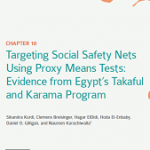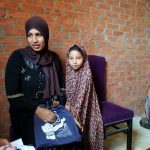IFPRI research was highlighted at the recent Takaful & Karama conference in Cairo, Egypt attended by several high-level policy makers including the Prime Minister, Minister of Social Solidarity, Minister of International Cooperation, Minister of Education, Minister of Supply and Internal Trade, Minister of Tourism, and a representative from the Ministry of Health.
Publication: Targeting Social Safety Nets Using Proxy Means Tests: Evidence from Egypt’s Takaful and Karama Program
Sikandra Kurdi, Clemens Breisinger, Hagar ElDidi, Hoda El-Enbaby, Daniel O. Gilligan, and Naureen Karachiwalla
This chapter from ReSAKSS Annual Trends and Outlook Report (2017-2018) uses Egypt as a case study to examine the effectiveness of proxy means test (PMT) targeting. Targeting effectiveness is defined in terms of the ability of the program to enroll beneficiaries from the lowest two quintiles of the expenditure distribution.
Evaluation finds successes for Egypt’s first conditional cash transfer program
Hoda El-Enbaby, Research Associate, IFPRI Egypt
In 2015, the Egyptian government implemented a series of major economic reforms, including ambitious antipoverty programs. To protect the poor and better target them for assistance, the Ministry of Social Solidarity (MOSS), with the support of the World Bank (WB), launched the “Takaful & Karama” Programme(TKP), Egypt’s first national conditional cash transfer (CCT) program.
Policy Brief: Egypt’s Takaful and Karama cash transfer program: Evaluation of program impacts and recommendations
[available in English and Arabic]
Egypt has been providing cash to poor households through its first conditional cash transfer program, Takaful and Karama, a social protection program run by the Ministry of Social Solidarity (MoSS), since March 2015. Takaful (“Solidarity”) supports poor families with children under 18, while Karama (“Dignity”) supports the elderly poor and people living with disabilities. The cash transfer program has enrolled 2.25 million families across all of Egypt’s governorates.




